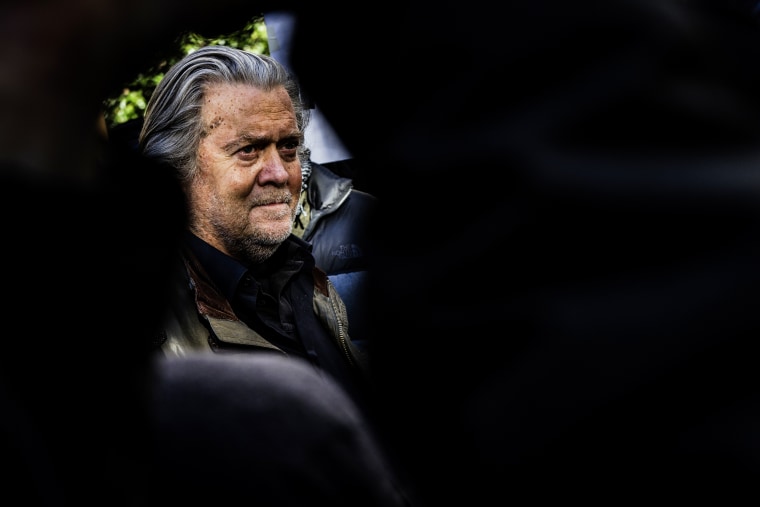Trump says he’ll waive executive privilege claim ahead of Steve Bannon’s Jan. 6 committee contempt trial
Bannon #Bannon

WASHINGTON — Former White House strategist Steve Bannon has said he’s “willing” to testify before the House Jan. 6 committee after he received a letter from former President Donald Trump saying he would waive his claim of executive privilege, according to two letters obtained Sunday by NBC News.
Bannon’s purported willingness to reverse course comes a little more than a week before jury selection is scheduled to begin in his contempt of Congress trial and after months of his stonewalling the committee’s investigation, which is entering its final stages with two public hearings scheduled for this week.
In the letter, Trump said that Bannon had been treated “unfairly” and had been forced to “spend vast amounts of money on legal fees” and that he would therefore waive claims of executive privilege, which have been disputed, if Bannon agrees to a time and a place to testify.
“I will waive Executive Privilege for you, which allows for you to go in and testify truthfully and fairly, as per the request of the Unselect Committee of political Thugs and Hacks, who have allowed no Due Process, no Cross-Examination, and no real Republican members or witnesses to be present or interviewed. It is a partisan Kangaroo Court,” the letter says.
In a separate letter to the committee, Robert Costello, a lawyer for Bannon, wrote that “Trump has decided that it would be in the best interests of the American people to waive executive privilege for Stephen K. Bannon, to allow Mr. Bannon to comply with the subpoena issued by your Committee. Mr. Bannon is willing to, and indeed prefers, to testify at your public hearing.”
 Steve Bannon, a former adviser to Donald Trump, speaks to members of the media after he appeared in federal court in Washington on Nov. 15.Samuel Corum / Bloomberg via Getty Images file
Steve Bannon, a former adviser to Donald Trump, speaks to members of the media after he appeared in federal court in Washington on Nov. 15.Samuel Corum / Bloomberg via Getty Images file
Costello, who communicated with the committee on Bannon’s behalf, is seeking to withdraw as Bannon’s counsel in the contempt of Congress case because he expects to be called as a witness, according to a court filing Friday.
Courts have overruled some of Trump’s efforts to invoke executive privilege to block information from the committee. The Supreme Court in January rejected an attempt to stop the National Archives from giving the committee hundreds of pages of documents from Trump’s time in the White House.
Bannon, who served in the White House for only seven months in 2017, was indicted in November by a federal grand jury and charged with two counts of contempt of Congress for defying a congressional subpoena from the committee. He was present at a meeting in a Washington hotel the day before the insurrection, where Trump supporters talked about possible efforts to overturn the election, the panel has said, adding that it would like to ask him about a Dec. 30 phone conversation in which Bannon is alleged to have urged Trump to focus his attention on Jan. 6.
U.S. District Judge Carl Nichols, the Trump appointee overseeing Bannon’s trial, also questioned his claims of executive privilege. Nichols said last month that it was “at best ambiguous” whether Trump’s claims of executive privilege covered the information sought in Bannon’s subpoena. Nichols has also ruled that Bannon cannot defend himself based on the notion that he was following the advice of counsel.
The White House Counsel’s Office advised Costello in a letter on Oct. 18 that Trump’s use of executive privilege in connection with the investigation was not valid and could not be asserted by Bannon, according to the FBI. The letter came about 10 days after the White House declined an attempt by the former administration to withhold documents from Congress about the riot.
NBC News legal analyst Barbara McQuade suggested on Twitter that the Bannon team’s letter to the committee was “a gimmick to provide a last-ditch defense in Bannon’s criminal case and poison the well in the Jan 6 investigation.”
Citing the publicity generated by the Jan. 6 committee, Bannon’s team had sought to delay his trial “in the middle” of ongoing public hearings.
NBC News obtained the letters following a request to Bannon’s legal team. The Guardian was first to report Bannon’s lawyer’s letter to the committee.
Rep. Zoe Lofgren, D-Calif., a member of the Jan. 6 committee, said Sunday on CNN’s “State of the Union” that the committee had received a letter from Bannon’s lawyer overnight saying he would testify.
“I expect that we will be hearing from him,” Lofgren said. “And there are many questions that we have for him.”
Bannon’s lawyers had argued that under Justice Department policies, former White House officials have no legal obligation to comply with congressional subpoenas when the president has asserted executive privilege. Bannon relied on those positions “in reasonably believing that the subpoena was not valid and that compliance was not, therefore, either appropriate or required as a matter of fact and law,” his lawyers told the judge in legal documents.
That defense is not available to Bannon, the government contended, because the subpoena dealt only with his actions as a private citizen long after he left government service and because Trump never directed him to ignore it.